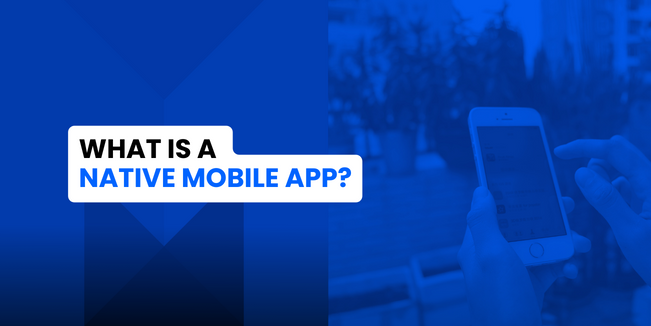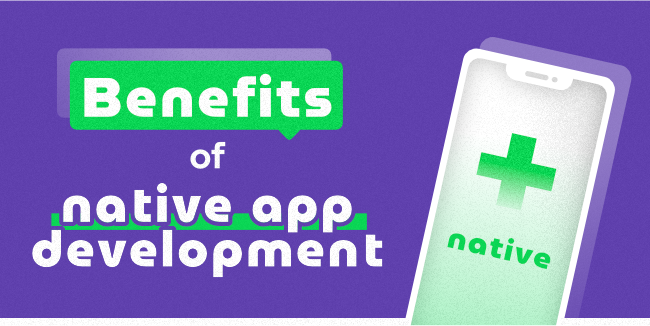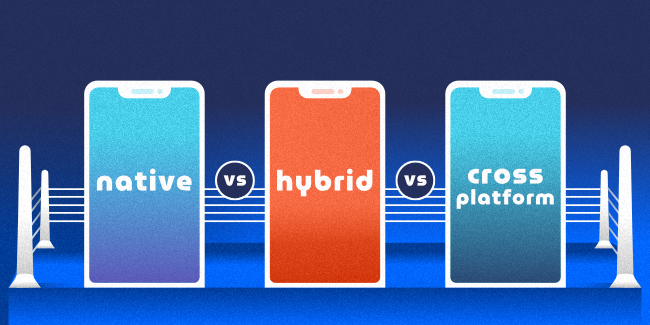appdevelopment
nativeappdevelopment
mobile
What is a Native Mobile App Development?

One of the most popular ways to create applications, programs, or just software is to make them natively. Native app development means creating a mobile application that is tailored and dedicated to a specified platform like iOS or Android. If you want to find out which platform to focus on, you will surely be interested in our article "Which platform to choose for your app - Android or iOS? Guide for product owners" in which we provided tips on what to consider when choosing and discussed one and second platform for development.
Many people are overwhelmed with superlatives about native app development, but why? We will try to answer this and many other questions about the native in the following article. We will go deep into native app development, explaining what it is characterized by, and presenting advantages and disadvantages so that you can know what you may require when you decide to work with a native application development company like us.
What is Native App Development
Native app development means creating a mobile application that is tailored and dedicated to a specified platform like iOS, or Android.
Because native applications are built specifically for the operating system, they provide higher user engagement than hybrid apps. Native mobile apps generally perform and look better than their web-based counterparts, which must serve numerous platforms. Furthermore, native mobile applications have access to devise hardware and capabilities, such as sensors and cameras, that are not available via a mobile browser interface alone.
Native mobile apps, unlike websites and web applications, do not operate in the browser. They must be downloaded from platform-specific app stores like Apple's App Store and Google Play. Each program may be accessed by tapping its icon on your device's screen after installation.
Native applications are more complicated to create than mobile websites. There's no need to be concerned about browser compatibility or behavior. You may use the native capabilities of mobile operating systems to create a richer user experience and implement app features.
In other words, native applications are software explicitly created for a single platform. Programming languages and tools designed for a single platform are used to create the application. You can build an Android app in Java or Kotlin while creating an iOS app in Swift and Objective-C. You are probably wondering what to choose if you are interested in iOS application development. Fortunately, we've prepared an article, “Swift vs. Objective-C: Which One to Choose For Your iOS App?” in which we outline all the pros and cons of Objective-C and Swift. Those apps tend to provide exceptional user experience since they're usually high performance. Because the visuals are tailored to the platform's UX, the user experience is also improved.
Benefits of Native app development

Native Apps Have The Best Performance
The app is built and optimized for a particular platform when developed using native mobile app development. As a consequence, the app boasts significant performance. Native apps are quick and responsive since they are designed for that one platform and compiled with their core programming language and APIs. As a result, the application is considerably more efficient. The app is stored on the gadget, allowing the program to make good use of the device's processing power. The material and visual aspects of a native mobile application are already stored on users' phones, resulting in rapid load times.
Native Apps Are More Secure
Web applications are made with various browsers and technologies such as JavaScript, HTML5, and CSS. Developing a native mobile app is an excellent method to guarantee that your users have constant data security.
Native Apps Are More Interactive And Intuitive
Native mobile applications are considerably more responsive to user input and output. These apps consider their devices' OS environments, making them seem like an integral part of the device.
The best advantage of native mobile apps is a better user experience. Native applications are designed specifically for a particular operating system. They follow strict standards that ultimately improve and synchronize the user experience with the specific operating system. As a result, the app's flow is more natural since each platform has its UI criteria.
Users can interact with apps using actions and gestures they're already familiar with if they follow particular standards.
Developers can access the full feature set of devices thanks to native apps
Native apps are written specifically for a platform and take advantage of the device's capabilities. These applications can immediately access the device's hardware, such as the GPS, camera, and microphone, making them more rapid in execution. Push notifications are yet another significant benefit of choosing native app development. You'll have access to every API and tool offered by the platform that you're developing for. Technically, there are no restrictions on how the new app may be utilized.
Native apps are more likely to be bug-free
It's much more difficult to maintain two separate applications in the same codebase than keeping them in two different codebases. Because you do not depend on hybrid technologies like Xamarin or Cordova, native app development has fewer dependencies for bugs to develop. Hybrid apps utilize a bridge that can slow down development and result in a poor user experience. When new versions of Android and iOS are released, this issue becomes more apparent. Native app developers access recent software development kits (SDK) to develop applications with the most up-to-date features. Users of native applications benefit from platform advancements after updating the operating system because of this time lag.
We are dependent on a hybrid platform development tool like Xamarin or Cordova to implement the bridge to new operating system capabilities, which is inconvenient. The drawback of having to wait for the third-party developer of the hybrid app builder to incorporate it. Hybrid app development necessitates the use of frameworks such as Xamarin or Cordova. Every time a new UI kit feature is released, we must wait for the tool to catch up. When you build a hybrid app, you don't have as much control over the extra layer, which raises the possibility of bugs. Bugs are a significant problem when developing hybrid apps with the most recent features available for a specific operating system. It is an essential and often neglected aspect of building customer loyalty.
Better Store Support
Native apps are often easier to publish and rank higher in the app store than hybrid apps since they provide superior performance and speed. But the difference in most applications is unobtrusive.
Increased Scalability
The flexibility in resources management and the variety of tools accessible also make apps designed for the native environment more scalable.
Drawbacks Of Native Development
Costly
When you build native applications, it can be costly to launch for both iOS and Android. It implies that you'll need to hire two separate teams to work on different platforms.
Time Consuming
Because platform-specific development is time-consuming, reusing the same work for another platform would be difficult. Instead, a separate team would be required to develop the alternative version.
Updates
Developers frequently introduce new versions in native apps for a variety of reasons. The most common cause is to repair bugs and malfunctions. As a result, app store updates are necessary to download if the user isn't aware of these updates or skips them to save storage space.
Download Requirement
Before downloading a native app, make sure it's available on the App Store or Play Store. Downloading a native app entails several procedures. They must locate the app, go through the terms and conditions, and then download it. The download procedure may take a long time, especially if users aren't patient.
Examples of Native Apps
Native apps can quickly access several devices' services, such as a microphone, accelerometer, or push notifications. Navigation software, such as Waze, and social applications like Twitter are just two examples of native applications. Pokémon Go is an excellent example of a game that uses native technology.
Pokemon Go
Pokémon Go efficiently utilizes system capabilities - GPS for mapping areas, the camera for augmented reality, and the accelerometer to measure acceleration - for the best possible user experience. Pokémon Go may also use push notifications intended to bring users back to the game over time.
WhatsApp
WhatsApp is a widely used messaging program that can be downloaded on both iOS and Android devices. This platform was the fourth-most popular app in the world in Q3 2020, with over 140 million downloads. As a result, this native software example may be considered for business communication solutions at work.
Spotify
One of the most popular native applications, Spotify - a well-known example - claims itself among the essential apps to have on smartphones of music listeners. To explain it, it's a digital music service center that gives users access to tens of thousands of songs and podcasts from various labels and media companies worldwide. In addition, Spotify is one of the most prominent cloud-native application examples owing to Google Cloud's efficiency-boosting capabilities. To better serve customers, Spotify has boosted performance efficiency in its tasks by leveraging Google Cloud.
Waze
Waze is a GPS navigation program that has delighted drivers all around the world. This native app example works on Android and iOS devices with built-in GPS capabilities. The app enables users to navigate by providing turn-by-turn directions, route specifics, and user-submitted transit times. Waze also has the benefit of being completely free to download and use.
Native app development for iOS
The iOS operating system, unlike Android, is completely closed source and is designed solely for Apple's hardware. To develop native mobile apps for the iOS platform, you'll need a Mac computer. Objective-C and Swift are the two options for building native iOS apps. Apple offers several excellent tools and resources for iOS development, such as:
- iOS SDK integrated with the Cocoa Touch UI framework,
- XCode, the official IDE for iOS development,
- Swift Playgrounds, a learning platform for Swift development,
- TestFlight, a beta testing app.
Native app development for Android
You can create native Android apps in Java, Kotlin, and C++. Google gives you powerful Android development tools, such as:
- The Android Software Development Kit (SDK), which comes with Android Studio, is the official IDE (integrated development environment) for Android,
- Command-line tools for Windows, Mac, and Linux,
- Firebase, a comprehensive mobile development platform,
- Android Jetpack, a collection of pre-made Android components.
There are several third-party tools for Android development, both inside and outside Google.
Native App Development vs. Hybrid vs. Cross-platform

Cross-platform, native, and hybrid apps are three categories of mobile applications. They appear to have similar functions and appearances on the surface, but their underlying technology is quite different. Hybrid apps, as the name implies, are a mix of web applications and native mobile apps. They're made with web technologies such as HTML, CSS, and JavaScript. Customers may also install them on their Android or iOS devices via app stores.
Native app development
As we said above, the Native apps run on a specific technology dedicated to either the Android or iOS platform. As a result, software development for Android and iOS requires different approaches. Kotlin or Java are used to develop Android mobile apps. Swift or Objective C may be used to create iPhone applications.
Android and iOS platforms are essential because they provide a variety of possibilities for the app. Because the software is designed to operate on both platforms, it will have a high level of quality. Native mobile developers utilize the platform's resources and code them to work effectively.
Features
- Robust performance is delivered by more straightforward code,
- Offline environments are far more conducive to full functioning,
- High usability of API,
- Great UI/UX - customized user interface components improve the user experience,
- It's simpler to avoid bugs,
- Each platform has its unique theme, allowing you to adjust the design for various screen sizes.
When to use it?
- When you only need one platform to publish your mobile app, it's an excellent time to use it,
- When your app is constantly reliant on a Camera, GPS, and other native features,
- You want to provide your audience with the most incredible experience possible, mainly when your company introduces a new app.
Hybrid mobile development
Hybrid mobile app development mixes the characteristics of a native application and web app. Mobile developers create hybrid mobile apps using well-known languages such as JavaScript, HTML, and CSS. Making hybrid apps consists of creating backend codes based on the native shell (Android or IOS) which then can be uploaded to Google Play or Apple App Store. A hybrid app combines elements from both mobile and web apps to rapidly produce a finished product that may be targeted across platforms.
Features
- Hybrid Mobile app developers are reasonably inexpensive,
- Because the backend code is essentially the same for all mobile versions, the app reaches the market sooner,
- Hybrid apps are considerably simpler to re-code to release new versions.
When to use it?
- You'll have a larger audience that will use your app on various platforms, both mobile, and web,
- When you create simple apps to interact with your consumers without using complex animations or other complicated elements,
- When you're time-bound and want to develop an application that will run on many platforms,
- To test your concept in a minimal viable product (MVP).
Cross-platform mobile development
Cross-platform development shares the same codebase as hybrid development. Yes, mobile developers use the same native elements to create the app, but they differ in providing a great user experience with different UI. Cross-platform mobile development involves creating a single application that may operate on various operating systems rather than developing distinct versions of applications for each platform. Cross-platform app development is driven by the goal of producing software that works well in more than one diverse digital environment, with the primary aim of marketing it to a broader client base. You can learn more about cross-platform development in our article "What is cross-platform development?".
Cross-platform apps are becoming more and more popular, thanks to Flutter and React Native. Head out to our article "Flutter vs. React Native: which one is better?" to see a comparison of these two solutions.
Features
- Cross-platform apps can be used to develop systems and apps that are more efficient and less expensive,
- You can add functions and capabilities rapidly since the code base only necessitates a minor change,
- UI performance matches with Native apps as it shares a similar codebase
When to use it?
- Initially low on budget, cross-platform is the ideal choice,
- If you are unaware of which groups to target, launch your app to target both audiences,
- Your app is not complex and does not require extensive coding
Summing up
Native development is the way to go if you want to build a high-performance app, which will work on a given platform. It may be more costly than developing a hybrid or cross-platform application, but in the long term, it may be the solution that will bring you success. If you would like to develop a native app we are always happy to share our expertise and knowledge in that field. Use our Free Consultation service to meet with our CTO, who will dispel all doubts.
If you're curious about how much hybrid apps cost in comparison to native apps, we've prepared an article, "Software Development Costs - Everything You Need to Know + Free Estimation", In this guide, you will find detailed price ranges for small, mid-sized and large app development projects based on product complexity. You will also learn about hidden costs and other considerations before making a final decision about your budget.